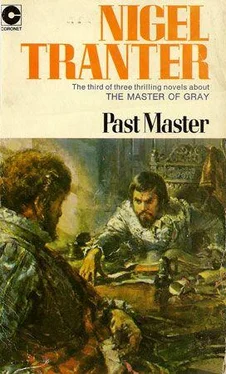Nigel Tranter - Past Master
Здесь есть возможность читать онлайн «Nigel Tranter - Past Master» весь текст электронной книги совершенно бесплатно (целиком полную версию без сокращений). В некоторых случаях можно слушать аудио, скачать через торрент в формате fb2 и присутствует краткое содержание. Жанр: Исторические приключения, на английском языке. Описание произведения, (предисловие) а так же отзывы посетителей доступны на портале библиотеки ЛибКат.
- Название:Past Master
- Автор:
- Жанр:
- Год:неизвестен
- ISBN:нет данных
- Рейтинг книги:5 / 5. Голосов: 1
-
Избранное:Добавить в избранное
- Отзывы:
-
Ваша оценка:
- 100
- 1
- 2
- 3
- 4
- 5
Past Master: краткое содержание, описание и аннотация
Предлагаем к чтению аннотацию, описание, краткое содержание или предисловие (зависит от того, что написал сам автор книги «Past Master»). Если вы не нашли необходимую информацию о книге — напишите в комментариях, мы постараемся отыскать её.
Past Master — читать онлайн бесплатно полную книгу (весь текст) целиком
Ниже представлен текст книги, разбитый по страницам. Система сохранения места последней прочитанной страницы, позволяет с удобством читать онлайн бесплатно книгу «Past Master», без необходимости каждый раз заново искать на чём Вы остановились. Поставьте закладку, и сможете в любой момент перейти на страницу, на которой закончили чтение.
Интервал:
Закладка:
The interim was longer than any expected. Elizabeth, although nearing seventy, never robust and now a sick woman, had the spirit of a lioness, and clung to life tenaciously. Nor would she so much as countenance the possibility of her demise by naming her successor. Patrick, who knew her so well, had long recognised that she would never so oblige them – even though James himself kept trying to cajole such admission from her, to the end. Patrick's policy was concerned with others – those who surrounded the Queen, and those in opposition to them. He went to work on the susceptibilities, ambitions and the judgement of all in the major factions in England, patiently, systematically, but subtly, brilliantly, by building up his picture of a wise and liberal monarch ruling a contented and prosperous realm, who was the only possible choice as successor to their famous Queen; he offered future privilege, position and reward for present support; and he even reversed the accustomed flow by sending money south, to carefully selected key figures who would use it to best advantage – being something of an expert on the matter of subsidies. This despite the continuing grievous shortage of money in Scotland. A host of Scottish envoys, representatives, informers and spies descended upon England, sounding, probing, subborning, intriguing, under the cloak of the ultra-respectable and patently honest Duke of Lennox, whose lack of both guile and concern about the issue was obvious to all. And all the time, discreetly back from the Borderline, troops waited, in every town and burgh -not so large an army as Patrick would have liked to see, but sufficient to form a swift and ruthless striking-force to spearhead the move on London should more subtle methods fail.
The provision of the necessary funds for all this continued to be one of Patrick's greatest headaches, in a land where money always had been the scarcest of commodities; his success in the matter was probably one of his greatest triumphs, in consequence. The Pope's contribution, although now reduced, was still valuable. At one time it seemed as though His Holiness was going to dry up altogether, in disappointment of any sure evidence of Scotland's return to the true faith. Patrick had to sacrifice Elphinstone on the altar of expediency as scapegoat. The Vatican, in an effort to step up the pressure, published the King's letter suggesting the elevation of Bishop Drummond to the cardinalship, complete with James's incontestable signature – and Elphinstone, as Secretary, had to be made to confess that he had composed this letter and inserted it amongst other documents for signature, so that it was signed inadvertently by the King. However, skilful diplomacy turned even this mishap to good effect, secret assurances being sent to the Pope of James's increasing tendencies towards Catholicism to the extent that he was suggesting that he might send his son and heir, Prince Henry, in a year or two's time, to be educated either in Rome or at the Court of Philip of Spain. Mollified and encouraged, the Vatican, noting that Queen Anne was now as good as a Catholic, resumed its subsidies – and Patrick Gray prayed for the speedy translation to a higher kingdom of Elizabeth Tudor.
It was one of his innermost personal satisfactions and proof that his machinations went undetected by the said Elizabeth and her Treasurer, at least, that to retain the good offices and services of Patrick Gray at this same juncture, an award of four hundred crowns a year was sent north, in order to 'aid in the suitable education of Andrew, son and heir of the Master of Gray' – a sum that continued to be paid indeed until the death of the Queen.
The Gowrie business had proved entirely successful, both in its direct and indirect results. Even despite the large grants of Ruthven lands to those who had aided in the matter, there was still a large surplus of the forfeited properties to come to the royal treasury – as well as the cancellation of the deplorable?80,000 debt. Moreover, the King's late colleagues in conspiracy, the Murrays, Erskines and the rest, could now be persuaded effectively to contribute quite large sums, on account of their new holdings and in anticipation of further benefits in England. Even better, the nobility at large, having seen what had happened to Gowrie who had been most outspoken in refusing to contribute to the nation's needs, now hastily chose the wiser and patriotic course, and dipped reluctant hands deep into pockets, their own and even more so, their vassals'.
One other small side issue of the Gowrie affair, which might have proved unfortunate, was happily disposed of by Gray wits – in this case partly by Mary Gray's wits. The King was still hot against the Lady Beatrix Ruthven's continued presence at Court, in the Queen's entourage, and the royal spouses were indeed more fiercely at odds on this subject than on any other. But it was obviously only a question of time until the unfortunate young woman paid the penalty of being sister to the Gowrie brothers, since she could not remain a captive in the Queen's apartments indefinitely. Mary was much worried on her friend's account.
One afternoon she ran Patrick to earth in the new bowling-green being constructed at Holyroodhouse, after considerable searching; for although her father should have been the busiest man in the kingdom, and bogged down in paper-work and affairs, in fact he appeared to be one of the most idle of men, with little of consequence to do much of the time – so adept was he at ensuring that others contributed the necessary labour to put his schemes, ideas and decisions into effective action. No man, he held, with the burden of major decision on him, ought to impare his faculties by dull toil and labour.
'You are the fairest sight these eyes have lighted on this day,' he greeted her, smiling. 'But since you seek me out thus, I fear the worst! What sin have I committed, my dear? What have I done now?'
She shook her head. 'It is not what you have done, Patrick. It is what you have not done. I asked you, besought you, to aid the Lady Beatrix. You have not done so.'
'Are you so sure? How do you know, Mary, what I have done? Beatrix does not suffer any hurt. She remains in the Queen's household. No steps have been taken against her. Why are you so sure that I have done nothing to aid her?'
'Because, if you had set your hand to the matter, it would have been to better effect. The Master of Gray does not deal in half-measures! The Lady Beatrix is no better than a prisoner, in fear for her life. The King smokes against her, declaring her to be the last of a viper's brood! Only the Queen's protection saves her. But how long can that last? The Court moves to Falkland soon. It is close quarters at Falkland – little space for any. When the Lady Beatrix leaves the Queen's apartments here at Holyroodhouse, will she ever see Falkland? Does the King not but wait for that?'
'I fear that you misjudge His Grace, my dear – you who used to play his friend, to speak for him when others decried. Was not this fair ear the repository for many a slobbering confidence?'
'I have learned King James's true nature, to my cost. He is a tyrant, a murderer!'
'A pox, girl – watch what you say! Even I could not save you if word of that sort of talk was carried to his ears.'
'To be sure. It was for less than that that he murdered Lady Beatrix's brothers!'
'Have a care, Mary, 'fore God! It is not like you to be so witless. You cannot, must not, accuse the King of the death of the Gowrie brothers. They sealed their own fate when they conspired against James…'
'Patrick – need you lie to me? Here, where none can overhear us. You know, as do I, that it was not the Ruthvens who conspired. But the King… and his advisers!'
'Idle tales, Mary. The slanders of false and malicious tongues.'
Читать дальшеИнтервал:
Закладка:
Похожие книги на «Past Master»
Представляем Вашему вниманию похожие книги на «Past Master» списком для выбора. Мы отобрали схожую по названию и смыслу литературу в надежде предоставить читателям больше вариантов отыскать новые, интересные, ещё непрочитанные произведения.
Обсуждение, отзывы о книге «Past Master» и просто собственные мнения читателей. Оставьте ваши комментарии, напишите, что Вы думаете о произведении, его смысле или главных героях. Укажите что конкретно понравилось, а что нет, и почему Вы так считаете.












